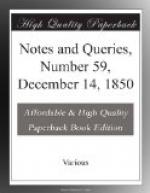Query: Why have the men of Gotham been long famous for their extreme folly?
My authorities are,—
1. The Nursery Rhyme,—
“Three wise men of Gotham
Went to sea in a bowl;
If the bowl had been stronger,
My story would have been longer.”
2. Drunken Barnaby’s Journal (edit. London, 1822, p. 25.), originally printed 1774, London:
“Veni Gotham, ubi multos
Si non omnes, vidi stultos,
Nam scrutando reperi unam
Salientem contra lunam
Alteram nitidam puellam
Offerentem porco sellam.”
“Thence to Gotham, where,
sure am I,
If, though not all fools, saw I
many;
Here a she-bull found I prancing,
And in moonlight nimbly dancing;
There another wanton mad one,
Who her hog was set astride on.”
{477} 3. In the “Life of Robin Hood” prefixed to Ritson’s Collection of Ballads concerning Robin Hood (People’s edit. p. 27.), the following story, extracted from Certaine Merry Tales of the Madmen of Gottam, by Dr. Andrew Borde, an eminent physician, temp. Hen. VIII. (Black letter), in Bodleian Library, occurs:—
“There was two men of __Gottam_, and the one of them was going to the market to Nottingham to buy sheepe, and the other came from the market; and both met together upon Nottingham bridge. Well met, said the one to the other. Whither be yee going? said he that came from Nottingham. Marry, said he that was going thither, I goe to the market to buy sheepe. Buy sheepe? said the other, and which way wilt thou bring them home? Marry, said the other, I will bring them over this bridge. By Robin Hood, said he that came from Nottingham, but thou shalt not. By Maid Marrion, said he that was going thitherward, but I will. Thou shalt not, said the one. I will, said the other. Ter here! said the one. Shue there! said the other. Then they beat their staves against the ground, one against the other, as there had been an hundred sheepe betwixt them. Hold in, said the one. Beware the leaping over the bridge of any sheepe, said the other. I care not, said the other. They shall not come this way, said the one. But they shall, said the other. Then said the other, and if that thou make much to doe, I will put my finger in thy mouth. A t..d thou wilt, said the other. And as they were at their contention, another man of Gottam came from the market with a sack of meale upon a horse, and seeing and hearing his neighbours at strife for sheepe, and none betwixt them, said, Ah, fooles, will you never learn wit? Helpe me, said he that had the meale, and lay my sacke upon my shoulder. They did so and he went to the one side of the bridge, and unloosed the mouth of the sacke, and did shake out all his meale into the river. Now, neighbours, said the mall, how much meale is there in my sacke now? Marry, there is none at all, said they. Now, by my faith, said he, even as much wit as in your two heads, to strive for that thing you have not. Which was the wisest of all these three persons, judge you?”
4. Tom Coryat, in an oration to the Duke of York (afterwards Chas. I.), called Crambe, or Colwarts twice sodden (London, 1611), has this passage:—




